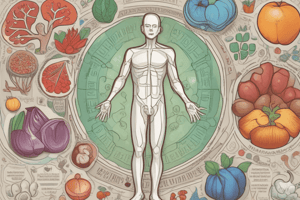Podcast
Questions and Answers
What is the recommended duration for engaging in moderate aerobic activities per week for adults?
What is the recommended duration for engaging in moderate aerobic activities per week for adults?
- 75 minutes per week
- 90 minutes per week
- 60 minutes per week (correct)
- 30 minutes per week
Which strategy is NOT mentioned as a way to foster positive mental health?
Which strategy is NOT mentioned as a way to foster positive mental health?
- Regular medical screenings (correct)
- Taking breaks
- Practicing gratitude
- Establishing boundaries
What is the primary focus of preventive medicine?
What is the primary focus of preventive medicine?
- Avoiding illness before it occurs (correct)
- Managing chronic conditions
- Treating symptoms after illness appears
- Providing immediate relief from symptoms
Which factor is NOT mentioned as a way to improve sleep hygiene?
Which factor is NOT mentioned as a way to improve sleep hygiene?
What contributes to maintaining good mental health according to the text?
What contributes to maintaining good mental health according to the text?
Which type of exercises should be combined with vigorous aerobic activities for adults, according to recommendations?
Which type of exercises should be combined with vigorous aerobic activities for adults, according to recommendations?
What purpose does food serve beyond satisfying hunger?
What purpose does food serve beyond satisfying hunger?
Which of the following contributes to healthy weight management?
Which of the following contributes to healthy weight management?
What are the benefits of an active lifestyle?
What are the benefits of an active lifestyle?
What is a cornerstone of a nourishing diet?
What is a cornerstone of a nourishing diet?
How does reducing sugar and refined carbohydrate consumption impact health?
How does reducing sugar and refined carbohydrate consumption impact health?
What are some benefits of regular physical activity?
What are some benefits of regular physical activity?
Flashcards are hidden until you start studying
Study Notes
Understanding Human Health: Nutrition, Exercise, Mental Wellness, Disease Prevention, Sleep Hygiene
Human health is a complex tapestry woven from various threads such as our dietary choices, physical activity habits, mindset, preventive measures, and restorative slumber. In this exploration of human wellbeing, we'll dive into these interconnected elements and gain insights into how each plays a role in fostering overall health.
Nutrition
Nutritional science teaches us that food serves more purposes beyond satisfying hunger. It fuels our bodies with essential nutrients like vitamins, minerals, proteins, carbohydrates, fats, fiber, and water. Balanced eating helps regulate metabolism, supports organ function, contributes to healthy weight management, and provides energy throughout the day. Adequate intake of fruits, vegetables, whole grains, lean protein sources, legumes, nuts, seeds, and low-fat dairy products forms the cornerstone of a nourishing diet. Reducing sugar and refined carbohydrate consumption may also lower the risk of chronic diseases.
Exercise
An active lifestyle promotes cardiovascular fitness, muscle strength, flexibility, endurance, balance, and vitality. Regular physical activity has numerous benefits including reducing the risks of heart diseases, type II diabetes, obesity, cancers, depression, anxiety, dementia, and premature death. For adults, recommendations suggest engaging in at least 150 minutes per week spread over three to five days of moderate aerobic activities or 75 minutes weekly of vigorous aerobic exercises combined with muscular strengthening activities two times per week.
Mental health
Mindfulness, self-care practices, social connections, stress management techniques, and professional help contribute to maintaining good mental health. Modern life often brings challenges that negatively impact our emotional wellbeing; hence, it becomes crucial to prioritize self-love and resiliency while seeking support when needed. Taking breaks, practicing gratitude, and establishing boundaries can all foster positive mental health.
Disease prevention
Preventive medicine focuses on avoiding illness as opposed to treating its symptoms after they manifest themselves. Adopting a proactive approach towards staying fit and healthy reduces the likelihood of developing chronic conditions like cardiovascular diseases, cancer, diabetes, and respiratory disorders. Eating right, exercising regularly, limiting alcohol consumption, smoking cessation, vaccination updates, and regular medical screenings form effective strategies against common health threats.
Sleep hygiene
Inadequate or poor quality sleep impacts brain function, cognitive performance, mood regulation, immune response, and metabolic processes. Establishing a consistent sleep schedule, creating a calming bedroom environment conducive to relaxation, setting aside time free from screens before bedtime, and managing exposure to artificial light are just some ways to improve one’s sleep experience.
Within each facet of human health lies a world of nuances and intricate relationships. By exploring them individually and understanding their collective influence, we empower ourselves to make informed decisions leading to flourishing lives.
Studying That Suits You
Use AI to generate personalized quizzes and flashcards to suit your learning preferences.




